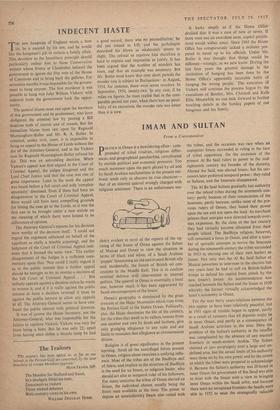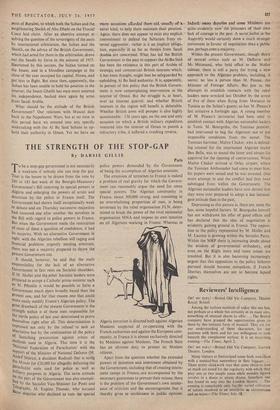IMAM AND SULTAN
From a Correspondent
pOLITICS in Oman is a bewildering affair : com- pounded of tribal rivalries, religious differ- ences, and geographical peculiarities, complicated by outside political and economic pressures. Too much insistence upon the parts played by oil and by Saudi Arabian machinations in the present out- break tends only to obscure its true character— that of an internal quarrel strongly charged with religious sentiment. There is an unfortunate ten- dency evident in most of the reports of the up- rising of the Imam of Oman against the Sultan of Muscat and Oman to view the situation in terms of black and white, of a Saudi Arabian `puppet' threatening an old and trusted British ally and, incidentally, the future of British oil con- cessions in the Middle East. This is to confuse external defence with intervention in internal politics. The quarrel in Oman is essentially a local one, however much it has been aggravated by Saudi encouragement of the Imam.
Oman's geography is dominated by the great crescent of the Hajar Mountains which runs from the Persian Gulf to the Indian Ocean. Politically, also, the Hajar dominates the life of the country, for the tribes that dwell in its valleys, remote from one another and torn by feuds and factions, give only grudging allegiance to any ruler and are liable to renounce that allegiance as circumstances dictate.
Religion is of great significance in the present uprising. Amid all the centrifugal forces present in Oman, religion alone exercises a unifying influ- ence. Most of the tribes are of the lbadhiya sect of Islam; and implicit in the structure of Ibadhiya is the need for an Imam, or religious leader, who should act also as temporal ruler of his followers. For many centuries the tribes of Oman elected an Imam, the individual chosen usually being the fittest man available at the time. The power to depose an unsatisfactory Imam also rested with the tribes, and the occasion was rare when an unpopular Imam succeeded in ruling in the face of tribal opposition. On the accession of the present Al Bu Said rulers to power in the mid- eighteenth century the founder of the dynasty, Ahmad ibn Said, was elected Imam; but his suc- cessors later preferred temporal power : they ruled as Sultans, and the Imamate disappeared.
The Al Bu Said Sultans gradually lost authority over the inland tribes during the nineteenth cen- tury; partly because of their renunciation of the Imamate, partly because, unlike most of the pre- vious rulers of Oman, they based their power upon the sea and not upon the land. As merchant princes their energies were directed towards over- seas expansion. By the close of the last century they had virtually become alienated from their people inland. The lbadhiya religion, however, still remained a force in Oman, and after a num- ber of sporadic attempts to revive the Imamate during the nineteenth century the tribes succeeded in 1913 in electing one of their own leaders as Imam. Not only was the Al Bu Said Sultan at Muscat powerless to intervene in the election but two years later he had to call on British-Indian troops to defend his capital from attack by the new Imam's forces. An accommodation was reached between the Sultan and the Imam in 1920 whereby the former virtually acknowledged the latter's autonomy in Oman.
For the next thirty years relations between the two appear to have been relatively peaceful, but in 1951 signs of trouble began to appear, partly as a result of rumours that oil deposits might lie in inner Oman, an& partly as a consequence of Saudi Arabian activities in the area. Here the problem of the Sultan's authority in the interfor was complicated by the absence of any marked frontiers in south-eastern Arabia. The Sultan claimed de jure sovereignty over a large and un- defined area, but the actual limits of his authority were those set by his own power and by the extent to whith the tribes were prepared to acknowledge it. Because the Sultan's authority was ill-based in inner Oman the government of Ibn Saud was able to treat with the Imam with a view to bringing inner Oman within the Saudi orbit; and because there were no recognised frontiers the Saudis were able in 1952 to seize the strategically valuable .oasis of Buraimi, to which both the Sultan and the neighbouring Sheikh of Abu Dhabi on the Trucial Coast laid claim. After an abortive attempt at solving the question of the sovereignty of the oasis by international arbitration, the Sultan and the Sheikh, on the advice of the British Government, Which had acted for them in the arbitration, drove out the Saudis by force in the autumn of 1955. Heartened by this success, the Sultan turned on the Imam, and in a bloodless campaign at the Close of the year occupied his capital, Nizwa, and put him to flight. But since then, apparently, the Sultan has been unable to hold his position in the interior; the Imam Ghalib has once more asserted his independence, backed once again by arms from Saudi Arabia.
What should be the attitude of the British Government? Our relations with Muscat date back to the Napoleonic Wars, but at no time in this period have we entered into any specific undertaking with the Al Bu Said Sultans to up- hold their authority in Oman. Yet we have on many occasions afforded them aid, usually of 'a naval kind, to help them maintain their position. Again, there does not appear to exist any explicit commitment to defend the Sultanate from ex- ternal aggression : rather is it an implicit obliga- tion, especially in so far as threats from Saudi Arabia are concerned. What has led the British Government in the past to support the Al Bu. Said has been the existence in this part of Arabia of strategic and commercial British interests which, it has been thought, might best be safeguarded by upholding Al Bu Said authority: It is, apparently, in pursuit of this policy that the British Govern- ment is now contemplating intervention in the interior of Oman. But the struggle is, at heart, over an internal quarrel; and whether British interests in the region will benefit is debatable. Whether British arms will prosper is also highly questionable : 136 years ago, on the one and only occasion on which a British military expedition ventured into the interior of Oman to punish a refractory tribe, it suffered a crushing reverse.































 Previous page
Previous page